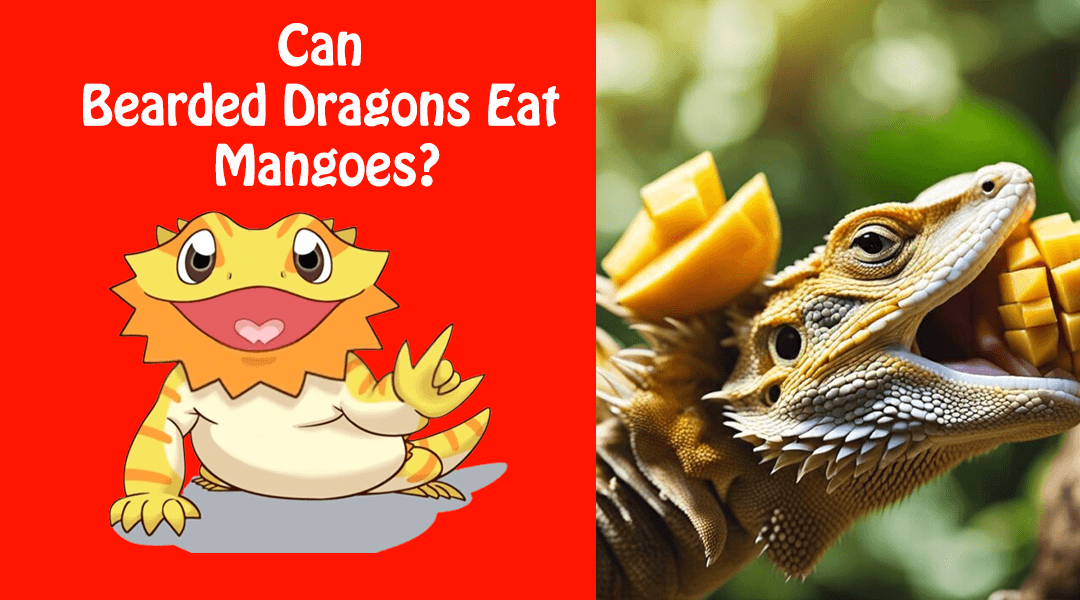Bearded dragons are known to be omnivorous, meaning they eat both plants and animals. As a result, it’s important to know what foods are safe for them to consume. One fruit that many bearded dragon owners may wonder about is mangoes. Can these sweet and juicy fruits be a part of a bearded dragon’s diet?
The answer is yes, bearded dragons can eat mangoes. Mangoes are a great source of vitamins and minerals, including vitamin C, vitamin A, and potassium. They also contain antioxidants and fiber. However, it’s important to note that mangoes should only be given to bearded dragons in moderation, as they are high in sugar and can lead to health issues if consumed in excess. In addition, the skin and pit of the mango should be removed before feeding it to your bearded dragon, as they can be difficult to digest and may cause blockages.
Understanding Bearded Dragons’ Dietary Needs
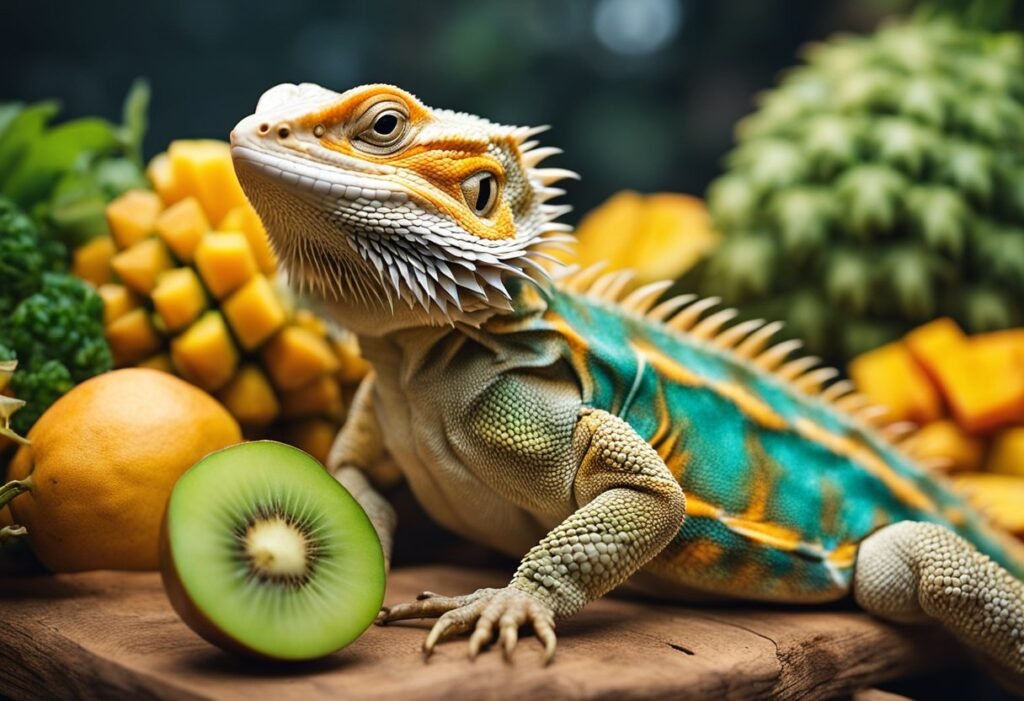
As responsible pet owners, it’s important to understand the dietary needs of our bearded dragons. These reptiles are omnivores, which means they eat both plants and animals. In the wild, they primarily consume insects, but they also eat fruits and vegetables.
When it comes to feeding bearded dragons, it’s important to provide a balanced diet that meets their nutritional needs. This includes a variety of protein sources, such as crickets, mealworms, and dubia roaches, as well as leafy greens and vegetables like collard greens, kale, and squash.
While fruits like mangoes can be a tasty treat for bearded dragons, they should only be fed in moderation. Fruits are high in sugar and can cause digestive issues if overconsumed. It’s recommended to limit fruit intake to once or twice a week and to only offer small amounts.
It’s also important to ensure that any food given to bearded dragons is appropriately sized and prepared. Insects should be appropriately sized for the dragon’s mouth and gut-loaded with nutritious foods before being fed. Vegetables should be chopped into small pieces, and fruits should be peeled and diced.
In summary, bearded dragons require a balanced diet that includes a variety of protein sources and leafy greens. While fruits like mangoes can be offered as a treat, they should be given in moderation to prevent digestive issues. By understanding their dietary needs and providing appropriate nutrition, we can ensure our bearded dragons live happy and healthy lives.
Can Bearded Dragons Eat Mangoes?
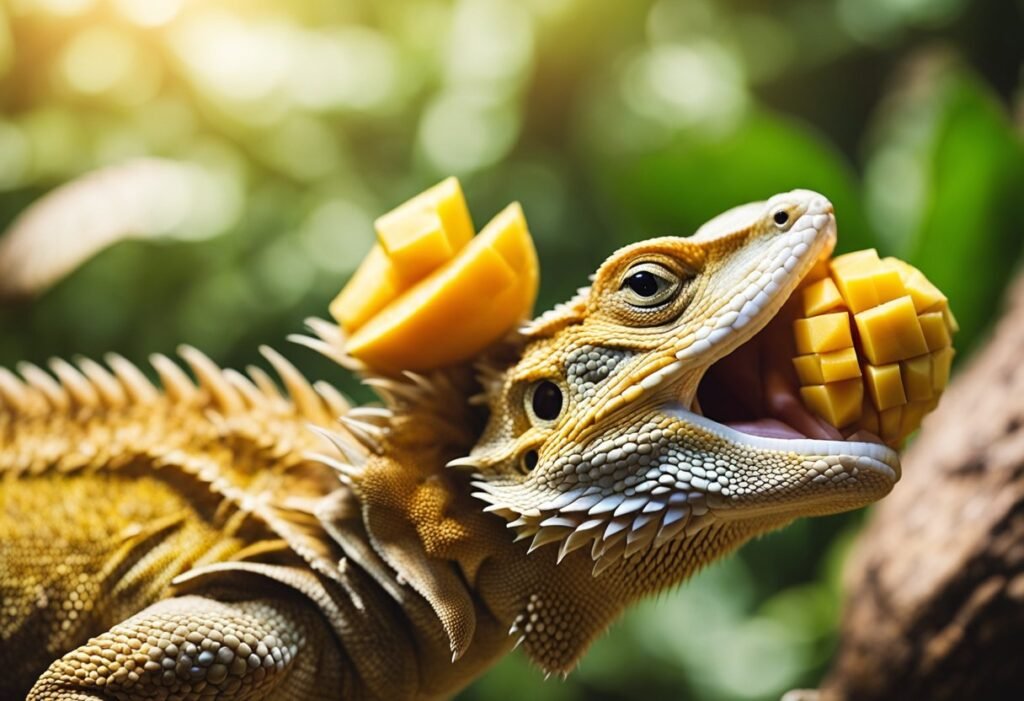
Mangoes are a delicious and nutritious fruit that many of us enjoy eating. But can our bearded dragon friends eat mangoes too? The answer is yes, bearded dragons can eat mangoes, but only in moderation.
Mangoes are high in sugar, which can lead to health problems such as obesity and diabetes in bearded dragons if consumed in excess. Therefore, it is important to limit their intake and only offer mangoes as an occasional treat.
In addition to being high in sugar, mangoes are also high in fiber, vitamins, and minerals, making them a nutritious addition to your bearded dragon’s diet. However, it is important to note that mangoes should not be the primary source of nutrition for your bearded dragon.
When feeding your bearded dragon mangoes, make sure to remove the skin and pit, as they can be difficult for them to digest. You can also cut the mango into small pieces to make it easier for your bearded dragon to eat.
Overall, while bearded dragons can eat mangoes, it is important to offer them in moderation and as part of a balanced diet. As always, consult with your veterinarian or a reptile nutritionist if you have any concerns about your bearded dragon’s diet.
Health Benefits of Mangoes for Bearded Dragons
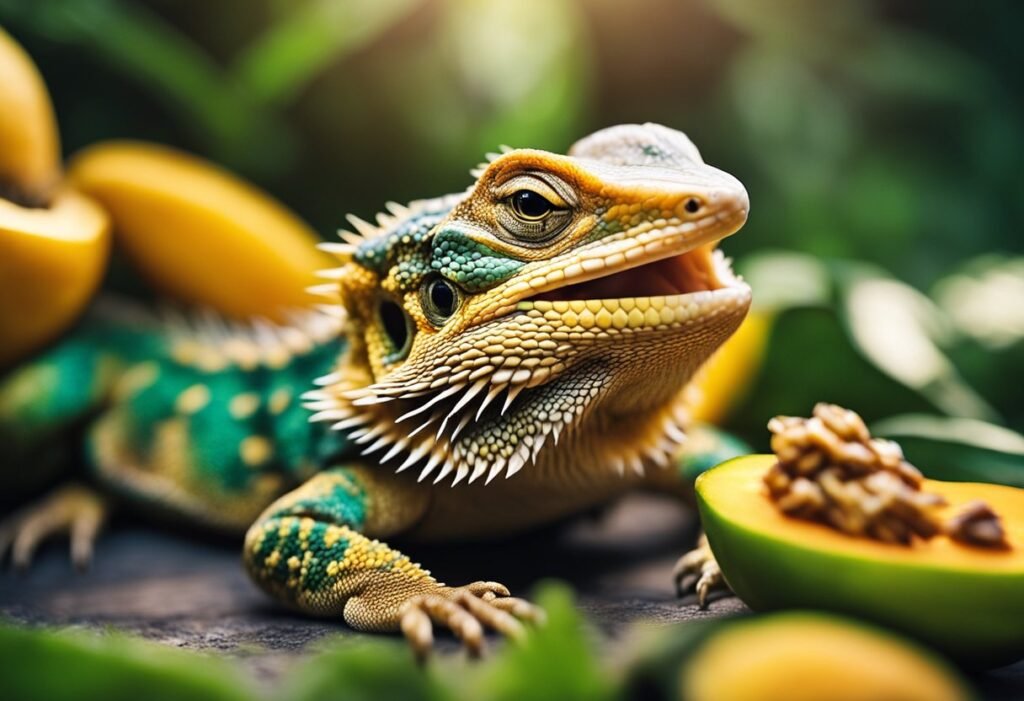
Mangoes are a delicious and nutritious fruit that can be a great addition to a bearded dragon’s diet. In this section, we will explore the health benefits of mangoes for bearded dragons.
Vitamin Content
Mangoes are an excellent source of vitamins that are essential for a bearded dragon’s health. They are particularly high in vitamin A, which is important for maintaining healthy eyesight and skin. Additionally, mangoes contain significant amounts of vitamin C, which is essential for a healthy immune system.
Fiber Content
Mangoes are also a good source of fiber, which is important for maintaining a healthy digestive system. Fiber helps to regulate bowel movements and can prevent constipation. This is particularly important for bearded dragons, as they are prone to digestive issues.
In conclusion, mangoes can be a healthy and tasty addition to a bearded dragon’s diet. However, it is important to remember that they should be given in moderation and as part of a balanced diet. As with any new food, it is important to introduce mangoes slowly and monitor your bearded dragon for any adverse reactions.
Potential Risks of Feeding Mangoes to Bearded Dragons
When it comes to feeding bearded dragons, it’s important to ensure that their diet is well-balanced and meets their nutritional requirements. While mangoes are a tasty treat that many bearded dragons enjoy, there are some potential risks to consider before adding them to your pet’s diet.
Sugar Content
Mangoes are known for their high sugar content, which can be problematic for bearded dragons. Ingesting too much sugar can lead to obesity, diabetes, and other health issues. Therefore, it’s important to feed mangoes to your bearded dragon in moderation and as a treat only.
Feeding Frequency
In addition to the sugar content, the frequency of feeding mangoes to your bearded dragon should also be considered. While it’s okay to offer them mangoes occasionally, feeding them too often can lead to digestive problems. Bearded dragons require a diet that is high in protein and low in sugar, so it’s important to ensure that their diet is well-balanced.
Overall, while mangoes can be a tasty treat for your bearded dragon, it’s important to feed them in moderation and as part of a well-balanced diet. If you have any concerns about feeding mangoes to your bearded dragon, it’s always best to consult with a veterinarian or a reptile specialist.
How to Feed Mangoes to Bearded Dragons
Preparation
Before feeding mangoes to your bearded dragon, it is essential to prepare the fruit properly. First, make sure to wash the mango thoroughly to remove any pesticides or dirt that may be present on the skin. Then, cut the mango into small, bite-sized pieces that are easy for your bearded dragon to eat. Be sure to remove the skin and pit, as they are not safe for bearded dragons to consume.
Serving Size
When feeding mangoes to your bearded dragon, it is important to keep the serving size in mind. Mangoes are high in sugar and should only be fed to your bearded dragon in moderation. We recommend offering mango as a treat, rather than a regular part of their diet. A good rule of thumb is to offer a small piece of mango, about the size of your bearded dragon’s eye, once or twice a week.
It is also important to remember that bearded dragons require a balanced diet of vegetables, protein, and calcium. Mangoes should not be the main source of nutrition for your bearded dragon. Instead, offer a variety of vegetables, such as collard greens, kale, and squash, along with insects like crickets or mealworms, to ensure that your bearded dragon is getting all the nutrients they need.
In conclusion, mangoes can be a tasty treat for your bearded dragon when fed in moderation. By properly preparing the fruit and keeping the serving size in mind, you can safely offer mango as a part of your bearded dragon’s diet. However, it is important to remember that mangoes should not be the main source of nutrition for your bearded dragon and should be offered alongside a balanced diet of vegetables, protein, and calcium.
Alternatives to Mangoes in Bearded Dragons’ Diet
As we have mentioned earlier, mangoes are a great source of vitamins and minerals for bearded dragons. However, if you are unable to find mangoes or your bearded dragon does not like them, there are other fruits and vegetables you can offer as an alternative.
- Papaya: This fruit is similar to mangoes in terms of nutritional value. It is rich in vitamin A and C, calcium, and potassium. It is also low in oxalates, making it a safe option for bearded dragons.
- Butternut Squash: This vegetable is high in vitamin A, which is essential for a bearded dragon’s health. It is also low in oxalates and has a good calcium to phosphorus ratio.
- Blueberries: This fruit is a good source of antioxidants and vitamin C. It is also low in oxalates and has a good calcium to phosphorus ratio.
- Collard Greens: This leafy green is an excellent source of calcium and vitamin A. It is also low in oxalates and has a good calcium to phosphorus ratio.
- Green Beans: This vegetable is low in oxalates and has a good calcium to phosphorus ratio. It also contains vitamin A and C.
When offering fruits and vegetables to your bearded dragon, it is important to remember to offer a variety of options to ensure they are getting a balanced diet. It is also important to avoid feeding them foods that are high in oxalates, such as spinach and kale, as these can bind to calcium and lead to health problems.
Frequently Asked Questions
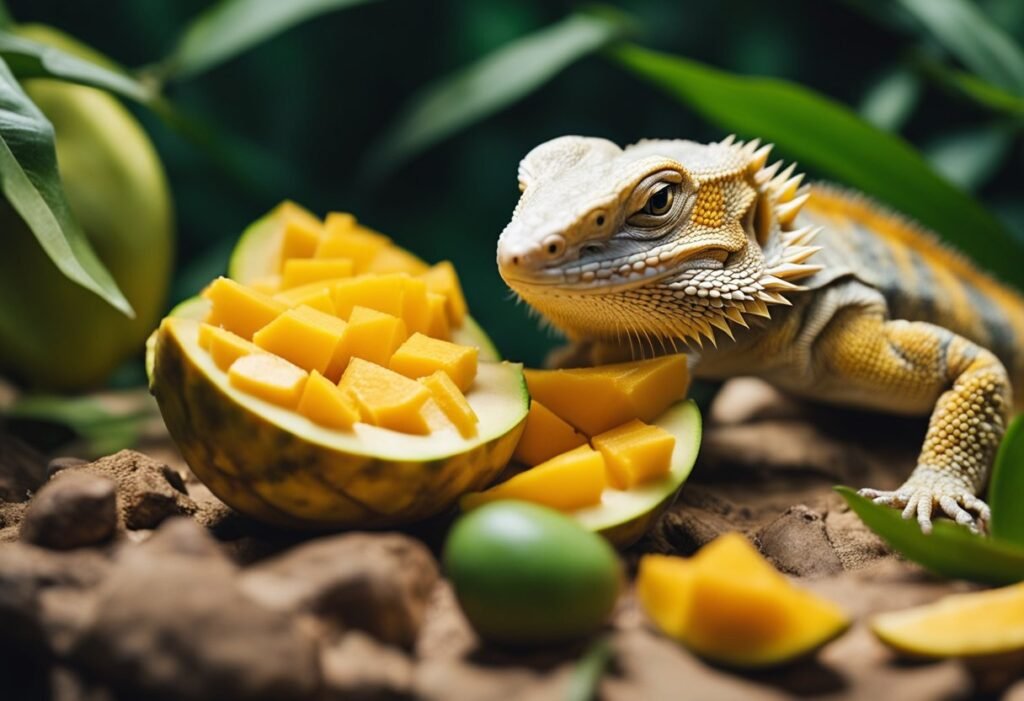
Is mango safe for bearded dragons to eat?
Yes, mango is safe for bearded dragons to eat in moderation. Mango contains high levels of vitamin A and C, which are essential for a bearded dragon’s health. However, it is important to note that mangoes are also high in sugar, so it should only be given to your pet occasionally as a treat.
What other fruits can bearded dragons safely eat?
Bearded dragons can safely eat a variety of fruits, including apples, blueberries, kiwi, and papaya. These fruits are all high in vitamins and minerals that are important for a bearded dragon’s health.
Are there any fruits that bearded dragons should avoid?
Yes, there are some fruits that bearded dragons should avoid. Citrus fruits such as oranges and lemons can cause digestive issues for bearded dragons. Avocado is also toxic to bearded dragons and should never be fed to them.
Can bearded dragons eat mango and cantaloupe together?
Yes, bearded dragons can eat mango and cantaloupe together. Both fruits are safe for bearded dragons to eat, and the combination can provide a variety of vitamins and minerals.
Is it okay to feed bearded dragons mango baby food?
No, it is not recommended to feed bearded dragons baby food, including mango baby food. Baby food often contains additives and preservatives that can be harmful to bearded dragons. It is best to stick to fresh fruits and vegetables.
Can bearded dragons eat bananas like they can eat mangoes?
Yes, bearded dragons can eat bananas like they can eat mangoes. Bananas are safe for bearded dragons to eat in moderation, but they are also high in sugar, so they should only be given occasionally as a treat.
I, Mark Antonelli am highly interested in pet care tips. The experiences I gained through university life in animal sciences were also helpful to identify the best tricks for caring for and feeding varying kinds of pets. I know the majority of people love to own a pet. Yet, there is a guilty of owing a Bearded Dragon due to a lack of information about how much friendly and peaceful they are. I thought of filling this gap with detailed writings about this Pogona genus Bearded Dragon. All my team is also giving me great support to fulfil my mission. Hope you will enjoy the journey with us.

